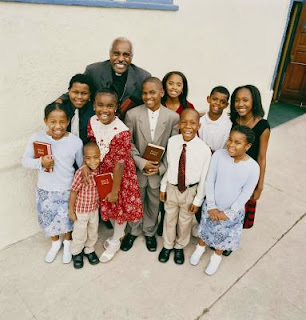1. Make it simple for families at home by offering resources for them to buy
Compile a list of recommended parenting books, kids devotionals, and workbooks for kids to equip them at home where most faith learning takes place. Even have some on hand that you can sell to them right at church.
2. Busyness does not equal effective ministry. Make events meaningful and less often.
Do not create too many programs that only further pull families away from their already busy schedules. You are not a social club, but a support for faith learning. Make any programs you do offer meaningful; don’t give in to the pressure to fill a calendar with busyness. Don’t feel the pressure to do what another church is doing; consider the unique make up of your church and prayerfully plan what suits the needs of your specific congregation. What is suitable for one congregation might miss the mark for another.
3. Spend money and resources on making your rooms kid-friendly
Your kids classrooms and nursery should be the cleanest, most organized, and the best decorated parts of your church. It’s an outward display of an inward commitment to excellence for the most vulnerable of our church. Cut down the clutter, and go through areas regularly to see them with eyes of a newcomer.
4. Please do not make a desperate request for teachers
Do not allow just anybody to serve. Keep high standards for who works with the most vulnerable of our congregation. Ask people you want directly. Go for the best. Parents will notice. It shows priority to those who we should be taking the best care of. I love having youth helpers and think it is vital for them to learn to serve. However, they are not to be relied upon. Adults are. Adults who typically are parents, involved in teaching, and who have a solid faith.
5. Set high standards, not low, for volunteers if you want to keep them.
Set a standard of commitment for those who volunteer. The least I allow for volunteer teachers is 4 weeks on 4 weeks off. Less than that and the person does not take ownership for their ministry. More than half of my teachers have asked if they can teach every Sunday because then it gives them full control over the run of the class. They take personal ownership and invest themselves in those kids' lives. If volunteers only teach occasionally, there is no ownership taken and the kids suffer. The volunteers burn out because they have no attachment to the kids or ministry.
6. You are not the source of the children's spiritual formation
Do not give parents the idea that the church does everything for their child’s spiritual development. Stress that you are only a support for what they are doing at home. A good portion of your time should be giving them resources and equipping them to lead their own children at home. Bring the ministry to homes, not just within your church.
7. Stop creating an environment where parents feel like the church needs them to be perfect
Provide a way that they can submit prayer requests to the church staff so they can be prayed for and problems can be dealt with together. They need to know they are not judged, but welcomed and loved in the mess of life.
8. Kids need God’s Word taught simply, and to be loved by an adult who listens
Stop thinking that the next best thing is always happening. It’ll be exhausting if you're always looking to order the new curriculum based on that season's new hit TV show. God’s word is life changing and captivating as it is.
What kids need to know about God and the Bible has not changed. Don’t sacrifice this for trying to stay current. If it works, great, but stop searching and searching for what just came out. Kids need what they have always needed: to know his Word, taught straight up. This is what changes their hearts. They also need to know that they have a space to be listened to and loved by a real person who takes the time to be in their classroom every week.
9. Give kids a family atmosphere at church; your goal isn’t entertainment atmosphere.
We are a body of believers. Brothers and sisters in Christ. Our ties together have to do with him alone. With encouraging one another and building one another up in our faith. Kids need this too. God’s Word changes lives. The love of his people showing his love to others is what lonely hearts need. It’s what your heart needs. It’s what our kids' hearts need.


No comments:
Post a Comment